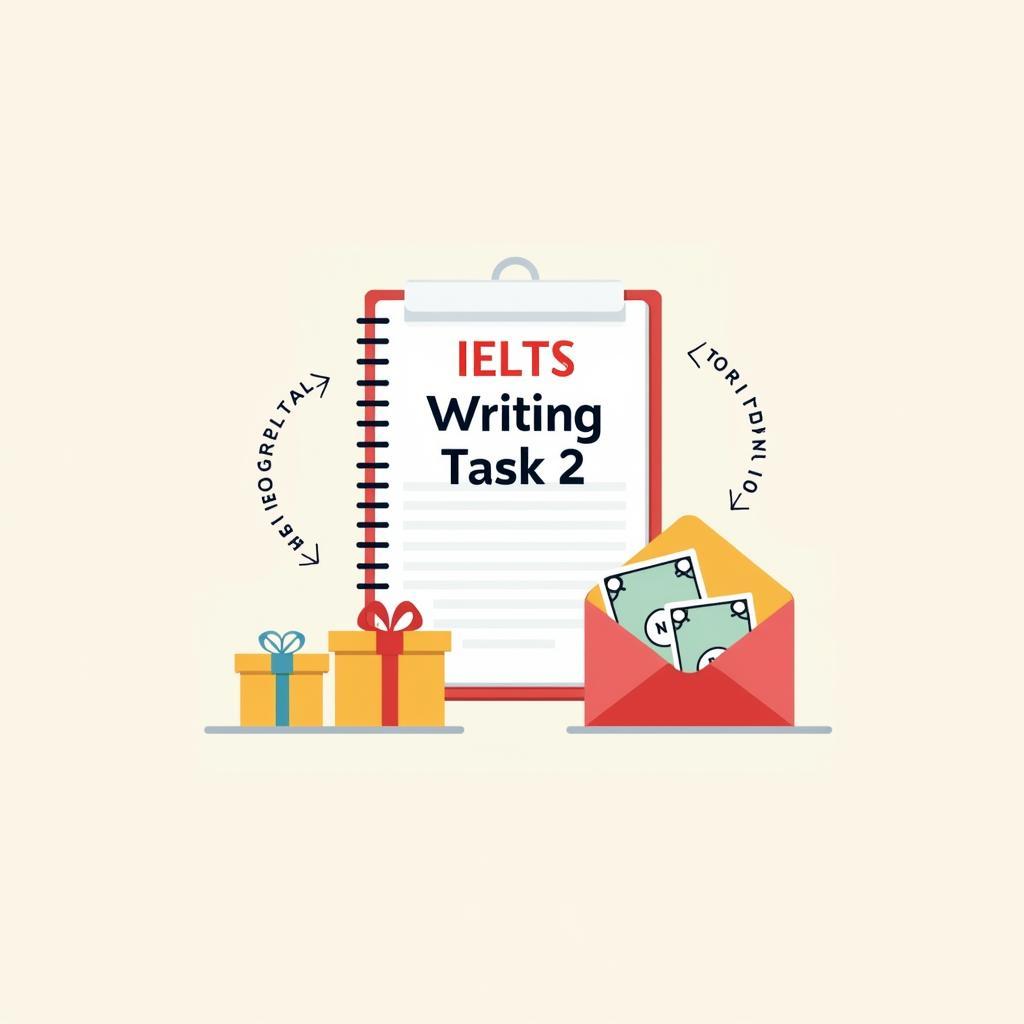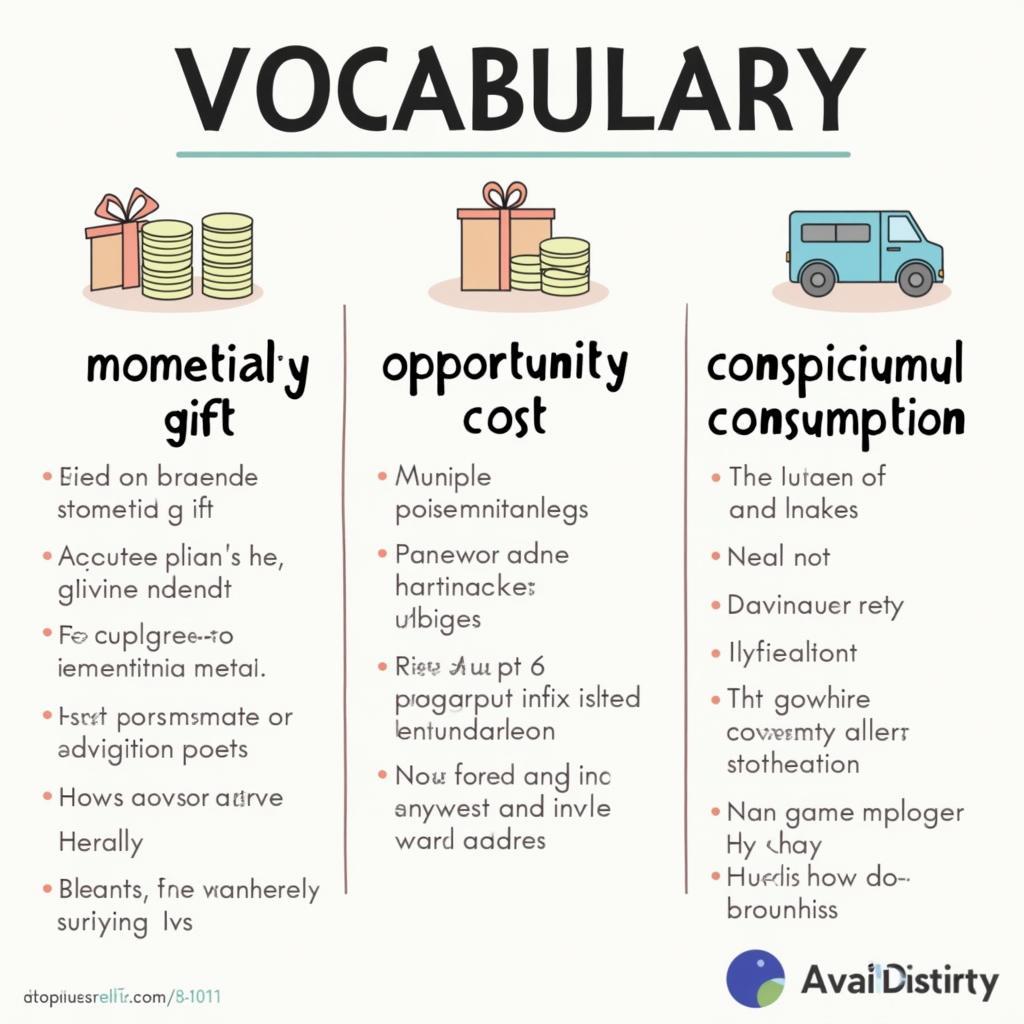Mở bài
Chủ đề Giving Money Instead Of Gifts On Special Occasions: Reasons And Positive Or Negative Development xuất hiện khá thường xuyên trong IELTS Writing Task 2 vì gắn với văn hóa tặng quà, tính thực dụng thời hiện đại và hành vi tiêu dùng. Khi nắm chắc cách xử lý, bạn có thể áp dụng cho các chủ đề tương tự như quà tặng cho trẻ em, tiền mừng cưới, quà sinh nhật và chuẩn mực xã hội. Trong bài viết này, bạn sẽ nhận được 3 bài mẫu theo dải Band 5-6, 6.5-7 và 8-9; phân tích chấm điểm theo 4 tiêu chí chính thức của IELTS; từ vựng trọng tâm kèm phiên âm IPA; 6 cấu trúc câu dễ ăn điểm; cùng checklist tự soát bài.
Một số đề thi/đề báo cáo đáng tin cậy về chủ đề này (được ghi nhận trên các nguồn uy tín như IELTS-Blog và IELTS Liz, nhóm Positive/Negative development – Discussion/Opinion):
- “Some people prefer to give money as gifts on special occasions rather than presents. Is this a positive or negative development?”
- “People nowadays tend to give money instead of material gifts at weddings and birthdays. Why is this the case? Is this a positive or negative development?”
- “In some countries, many parents give their children pocket money to spend as they wish. Discuss the advantages and disadvantages.”
Bài viết sẽ giúp bạn:
- Phân tích dạng đề chính xác, tránh lỗi bẫy;
- Học 3 bài mẫu có chú thích nổi bật và giải thích vì sao đạt band điểm tương ứng;
- Nắm trọn bộ từ vựng, cấu trúc câu và chiến lược lập dàn ý cho IELTS Writing Task 2.
 Giving money instead of gifts on special occasions trong IELTS Writing Task 2, phân tích đề và chiến lược
Giving money instead of gifts on special occasions trong IELTS Writing Task 2, phân tích đề và chiến lược
1. Đề Writing Part 2
People nowadays tend to give money instead of material gifts on special occasions. Why is this the case? Is this a positive or negative development?
Dịch đề: Nhiều người ngày nay có xu hướng tặng tiền thay vì quà vật chất vào các dịp đặc biệt. Tại sao lại như vậy? Đây là một sự phát triển tích cực hay tiêu cực?
Phân tích đề bài:
- Dạng câu hỏi: Two-part question (Reasons + Positive/Negative development). Bạn phải:
- Giải thích lý do (2-3 lý do thuyết phục);
- Kết luận xu hướng này là tích cực hay tiêu cực (hoặc cân bằng, nhưng cần chốt quan điểm rõ).
- Thuật ngữ quan trọng:
- “material gifts”: quà hữu hình (vật phẩm).
- “positive/negative development”: đánh giá tác động lâu dài về mặt cá nhân, xã hội, văn hóa.
- Lỗi thường gặp:
- Chỉ viết về “cho trẻ em tiền tiêu vặt” → lạc đề (đề nói “special occasions” rộng hơn).
- Không trả lời phần “Why” mà đi thẳng sang “positive/negative”.
- Quan điểm mơ hồ, không chốt ở mở bài/kết bài, thiếu chủ đề câu (topic sentence) rõ ràng.
- Cách tiếp cận chiến lược:
- Mở bài: paraphrase + nêu quan điểm tổng quát (overall it is positive/negative/mixed).
- Thân bài 1: Reasons (tiết kiệm thời gian, linh hoạt chi tiêu, văn hóa “tiền mừng”, tránh lãng phí).
- Thân bài 2: Đánh giá tác động (tích cực: hiệu quả, trao quyền người nhận; tiêu cực: giảm giá trị tinh thần, rủi ro thương mại hóa mối quan hệ).
- Kết bài: tóm tắt và khẳng định quan điểm.
2. Bài mẫu Band 8-9
Bài Band 8-9 cần lập luận nhất quán, dẫn chứng hợp lý, từ vựng linh hoạt, ngữ pháp chính xác và kiểm soát tốt độ mạch lạc.
Essay (≈300 words):
While material gifts have long carried sentimental value, many people now prefer cash envelopes on special occasions. This shift is largely driven by modern lifestyles and evolving social norms, and I argue that it is overall a positive development if practised thoughtfully.
One compelling reason is efficiency. In an era of overflowing schedules and online wish lists, money eliminates guesswork and reduces waste from unwanted items. Recipients can allocate funds toward what they truly need—be it savings, experiences, or essential purchases. A second driver is cultural pragmatism: in many communities, cash gifts at weddings or graduations are seen as practical support during life transitions rather than a lack of care. Finally, inflation and fast-changing tastes make cash more adaptable than material presents.
From a broader perspective, the trend brings several benefits. It respects individual agency, allowing recipients to tailor outcomes to their circumstances and avoid the opportunity cost of ill-suited items. It can also reduce conspicuous consumption and the pressure to perform generosity through price tags. Admittedly, critics worry that money is impersonal and potentially transactional. Yet this risk is not inherent to the medium but to the manner: a handwritten note, a thoughtfully chosen amount, or earmarking the gift for a shared plan can preserve warmth and meaning.
In conclusion, giving money instead of gifts is gaining ground because it is time-efficient, flexible, and culturally pragmatic. Though it may appear less sentimental, its impact depends on how thoughtfully it is given. With simple etiquette, cash gifts can combine practicality with genuine care, which makes this a largely positive development.
Phân tích Band điểm
| Tiêu chí | Band | Nhận xét |
|---|---|---|
| Task Response (Hoàn thành yêu cầu) | 8.5 | Trả lời đầy đủ cả “Why” và “positive/negative”, quan điểm rõ ràng từ mở bài đến kết bài. Lập luận có ví dụ và phản biện “impersonal/transactional” được xử lý hợp lý. |
| Coherence & Cohesion (Mạch lạc & Liên kết) | 8.0 | Bố cục 4 đoạn chuẩn; câu chủ đề rõ; liên kết logic với từ nối ẩn và lộ. Chuyển đoạn tự nhiên; có đối chiếu “critics worry… Yet…”. |
| Lexical Resource (Từ vựng) | 8.5 | Từ vựng đa dạng: agency, conspicuous consumption, earmarking, opportunity cost, transactional. Collocations chính xác; ít lặp. |
| Grammatical Range & Accuracy (Ngữ pháp) | 8.5 | Cấu trúc nâng cao: mệnh đề quan hệ, cụm phân từ, mệnh đề nhượng bộ. Hầu như không lỗi ngữ pháp/chấm câu. |
Các yếu tố giúp bài này được chấm điểm cao
- Luận điểm mở bài khẳng định quan điểm sớm, giúp định hướng người đọc.
- Lý do cụ thể, bám vào bối cảnh hiện đại (lịch trình bận rộn, lạm phát, khẩu vị thay đổi).
- Phản biện đối lập và hóa giải: “impersonal” phụ thuộc vào cách tặng, không phải bản chất tiền.
- Từ vựng học thuật hợp ngữ cảnh (opportunity cost, agency, conspicuous consumption).
- Collocations tự nhiên (carry sentimental value, eliminate guesswork, tailor outcomes).
- Câu chủ đề rõ và phát triển lý lẽ theo chuỗi nhân-quả.
- Kết bài đúc kết lập luận, nhắc lại luận điểm bằng từ ngữ khác.
3. Bài mẫu Band 6.5-7
Bài Band 6.5-7 thường có ý tưởng hợp lý, từ vựng đủ rộng, đôi khi còn lặp và kết nối chưa thật mượt; ngữ pháp có vài lỗi nhỏ nhưng không gây hiểu nhầm.
Essay (≈260 words):
In many celebrations today, people increasingly choose to give money rather than physical gifts. There are several reasons for this trend, and in my view it is mostly beneficial if people show some consideration when doing so.
Firstly, cash is convenient. Modern consumers have personal tastes and already own many items, so choosing a present can be risky and time-consuming. Money avoids this problem and lets the receiver decide how to use it, whether to buy a necessary product or save for future plans. Secondly, in some cultures, especially at weddings or housewarming parties, giving money is a practical way to support a new beginning. It can help young couples handle expenses more easily than receiving duplicated or unsuitable household goods.
Regarding its impact, the development is generally positive. Money reduces waste and gives flexibility, which seems more sensible in a fast-changing economy. However, some people feel that cash gifts are too plain and lack a personal touch. This concern is valid when the giver offers money with little thought. A simple message, a specific purpose suggested by the giver, or combining money with a small token can make the gesture more meaningful.
In conclusion, people give money on special occasions because it is convenient and adaptable, and because traditions in some communities encourage it. Although it may appear impersonal, this drawback can be minimized with polite and thoughtful behavior. Overall, I believe the trend is positive for both givers and receivers.
Phân tích Band điểm
| Tiêu chí | Band | Nhận xét |
|---|---|---|
| Task Response (Hoàn thành yêu cầu) | 7.0 | Trả lời đủ 2 phần (lý do + đánh giá). Quan điểm nhất quán, có gợi ý giải pháp “make the gesture more meaningful”. |
| Coherence & Cohesion (Mạch lạc & Liên kết) | 7.0 | Bố cục rõ; dùng từ nối cơ bản (Firstly, Secondly, However). Một số câu chuyển ý còn đơn giản. |
| Lexical Resource (Từ vựng) | 6.5 | Từ vựng phù hợp chủ đề: flexible, duplicated, personal touch. Một vài chỗ lặp “money”, “convenient”. |
| Grammatical Range & Accuracy (Ngữ pháp) | 6.5 | Câu phức có dùng nhưng chưa đa dạng; lỗi nhỏ về mệnh đề quan hệ và dấu phẩy không ảnh hưởng nghĩa. |
So sánh với bài Band 8-9
- Bài 8-9 dùng từ vựng học thuật hơn (agency, opportunity cost), còn 6.5-7 dùng từ phổ thông.
- Lập luận 8-9 có phản biện sâu và “hóa giải” rõ, trong khi 6.5-7 chỉ nêu và công nhận quan ngại.
- Liên kết trong 8-9 phần lớn là liên kết ý ngầm (implicit cohesion), tạo độ tự nhiên; bài 6.5-7 dựa nhiều vào từ nối cơ bản.
4. Bài mẫu Band 5-6
Bài Band 5-6 thường có ý tưởng liên quan nhưng phát triển chưa sâu, lặp từ, lỗi mạo từ/giới từ/thì động từ và câu đơn giản.
Essay (≈260 words) – lỗi được làm nổi bật:
Nowadays many people give money instead of gifts in special occasions. There are some reasons for this change. Firstly, it is more easier to give cash because you do not need to spend time choosing a present. People are busy and they don’t want to go to shopping for long time. Secondly, money can be used for anything, so the receiver will not get a gift which is not fit for them. Finally, in my country people give money in wedding because it is our culture.
However, some people say that money is cold and not emotional. I agree a part of this because when you give money without writing a message, it look too simple. Also, people may compare how much you give and then relationship become more worse. But I still think giving money is positive development because it save time and it is very useful to young couple who need to pay many expense.
In conclusion, giving money has reason like convenience and flexibility. Even it can be a little impersonal sometimes, if we add a small card or explain the purpose, it can be better. So I believe this is good trend for society.
Phân tích Band điểm
| Tiêu chí | Band | Nhận xét |
|---|---|---|
| Task Response (Hoàn thành yêu cầu) | 6.0 | Có trả lời “Why” và đánh giá tổng thể, nhưng lý do còn chung chung, thiếu ví dụ cụ thể. |
| Coherence & Cohesion (Mạch lạc & Liên kết) | 5.5 | Liên kết đơn giản, lặp cấu trúc; chuyển ý đột ngột; một số câu thiếu chủ ngữ rõ ràng. |
| Lexical Resource (Từ vựng) | 5.5 | Từ vựng cơ bản, lặp “money/gift”. Một số kết hợp từ sai (not fit, many expense). |
| Grammatical Range & Accuracy (Ngữ pháp) | 5.5 | Nhiều lỗi: mạo từ, so sánh hơn, danh từ số ít/số nhiều, thì và giới từ. Câu đơn chiếm đa số. |
Những lỗi sai của bài – phân tích & giải thích
| Lỗi sai | Loại lỗi | Sửa lại | Giải thích |
|---|---|---|---|
| in special occasions | Giới từ | on special occasions | Dùng “on” cho dịp cụ thể/thời điểm. |
| more easier | So sánh | easier | Không dùng “more” với tính từ đã ở dạng so sánh hơn. |
| go to shopping | Cấu trúc động từ | go shopping | Go + V-ing (shopping), không “to”. |
| not fit for them | Collocation/Ngữ pháp | not suitable for them | Suitable for + O là kết hợp từ đúng. |
| agree a part of this | Cụm cố định | partly agree with this | “Partly agree with + N/idea” chuẩn hơn. |
| it look too simple | Hòa hợp S-V | it looks too simple | Chủ ngữ số ít + “looks”. |
| more worse | So sánh kép | worse | Không dùng “more” với so sánh hơn dạng bất quy tắc. |
| many expense | Danh từ đếm được | many expenses / much expense | Expense đếm được khi nói các khoản. |
| positive development | Mạo từ | a positive development | Danh từ đếm được số ít cần mạo từ. |
| this is good trend | Mạo từ | this is a good trend | Cần “a” trước danh từ số ít “trend”. |
Cách Cải Thiện Từ Band 6 Lên Band 7
- Mở rộng lý do bằng ví dụ tình huống cụ thể (đám cưới, sinh nhật, tốt nghiệp) và hậu quả tích cực/tiêu cực.
- Đa dạng hóa từ vựng: thay “money” bằng cash, monetary gift, cash gift, financial support; thay “good” bằng beneficial/constructive.
- Nâng cấp câu: dùng mệnh đề quan hệ, cụm phân từ, câu điều kiện thay vì chỉ câu đơn.
- Rà soát lỗi mạo từ (a/an/the), danh từ số nhiều, hòa hợp chủ-vị.
- Tăng tính mạch lạc: thêm câu chủ đề rõ, sử dụng từ nối linh hoạt (nevertheless, thereby, consequently).
- Viết kết bài chốt quan điểm dứt khoát, tránh mơ hồ.
5. Từ vựng quan trọng cần nhớ
| Từ/Cụm từ | Loại từ | Phiên âm | Nghĩa tiếng Việt | Ví dụ (English) | Collocations |
|---|---|---|---|---|---|
| monetary gift | n | /ˈmʌnɪtəri ɡɪft/ | quà tặng bằng tiền | A monetary gift can be more practical than a gadget. | monetary contribution, monetary support |
| cash gift | n | /kæʃ ɡɪft/ | tiền mừng/tiền tặng | Cash gifts are common at weddings. | give/receive a cash gift |
| cash-in-envelope | n | /kæʃ ɪn ˈɛnvəloʊp/ | phong bì tiền | Cash-in-envelope is a widespread custom. | traditional cash-in-envelope |
| sentimental value | n | /ˌsɛntɪˈmɛntl ˈvæljuː/ | giá trị tinh thần | Handmade presents often carry sentimental value. | carry sentimental value |
| transactional | adj | /trænˈzækʃənl/ | mang tính giao dịch | Some argue money is too transactional. | a transactional relationship |
| social etiquette | n | /ˈsoʊʃl ˈɛtɪkɛt/ | phép tắc xã hội | Social etiquette varies across cultures. | observe/follow etiquette |
| tailor (to) | v | /ˈteɪlər/ | điều chỉnh cho phù hợp | Recipients can tailor spending to their needs. | tailor something to needs |
| budget constraint | n | /ˈbʌdʒɪt kənˈstreɪnt/ | hạn chế ngân sách | Budget constraints influence gift choices. | face budget constraints |
| opportunity cost | n | /ˌɒpərˈtjuːnɪti kɒst/ | chi phí cơ hội | Unwanted gifts create an opportunity cost. | reduce/minimize opportunity cost |
| conspicuous consumption | n | /kənˈspɪkjʊəs kənˈsʌmpʃən/ | tiêu dùng phô trương | Cash gifts may discourage conspicuous consumption. | discourage/encourage conspicuous consumption |
| token of appreciation | n | /ˈtoʊkən əv əˌpriːʃiˈeɪʃn/ | vật tượng trưng tri ân | Add a token of appreciation to keep it personal. | a small token of appreciation |
| misinterpret | v | /ˌmɪsɪnˈtɜːrprɪt/ | hiểu sai | Cash can be misinterpreted as careless. | misinterpret intentions |
| commodify | v | /kəˈmɒdɪfaɪ/ | thương mại hóa | Some fear we commodify relationships. | commodify culture/relationships |
| earmark | v | /ˈɪərmɑːrk/ | dành riêng cho | Earmark the gift for a shared experience. | earmark funds for |
| opt for | v | /ɒpt fɔːr/ | chọn | Many guests opt for money instead of gifts. | opt for simplicity |
 Bảng từ vựng chủ đề Giving money instead of gifts trong IELTS Writing Task 2 với ví dụ và collocations
Bảng từ vựng chủ đề Giving money instead of gifts trong IELTS Writing Task 2 với ví dụ và collocations
6. Cấu trúc câu dễ ăn điểm cao
- Câu phức với mệnh đề phụ thuộc
- Công thức: Mệnh đề chính + because/although/while/when + mệnh đề phụ.
- Ví dụ (trích bài Band 8-9): Although money may seem impersonal, its impact depends on how thoughtfully it is given.
- Vì sao ghi điểm: Tạo lập quan hệ nhân-quả/nhượng bộ rõ ràng, tăng độ tinh tế.
- Ví dụ bổ sung:
- While gifts carry sentimental value, cash is undeniably flexible.
- Because prices are rising, many guests prefer giving money.
- Lỗi thường gặp: Dùng dấu phẩy sai; thiếu chủ ngữ trong mệnh đề phụ.
- Mệnh đề quan hệ không xác định
- Công thức: Danh từ + , which/who + mệnh đề bổ sung,
- Ví dụ: It can reduce conspicuous consumption, which often pressures people to overspend.
- Ghi điểm: Bổ sung thông tin mượt, tránh câu rời rạc.
- Ví dụ bổ sung:
- Guests may give cash, which recipients can allocate freely.
- Some oppose the trend, which I find understandable.
- Lỗi: Quên dấu phẩy, dùng “that” thay “which” trong mệnh đề không xác định.
- Cụm phân từ (Participial phrase)
- Công thức: V-ing/V-ed + cụm bổ nghĩa, …
- Ví dụ: Eliminating guesswork, cash gifts reduce waste from unwanted items.
- Ghi điểm: Nén thông tin, tăng tính học thuật.
- Ví dụ bổ sung:
- Driven by convenience, many people opt for money.
- Seen as practical support, cash is welcomed at weddings.
- Lỗi: Lệch chủ ngữ (dangling participle).
- Câu chẻ (Cleft sentences)
- Công thức: It is/was + X + that/who + mệnh đề.
- Ví dụ: It is the manner of giving that determines how personal the gift feels.
- Ghi điểm: Nhấn mạnh ý quan trọng, làm lập luận nổi bật.
- Ví dụ bổ sung:
- It is practicality that many guests value most.
- It was inflation that changed people’s habits.
- Lỗi: Nhấn sai trọng tâm hoặc lạm dụng gây gượng gạo.
- Câu điều kiện nâng cao
- Công thức: If…were to…, …/ If + should + V, …/ Unless…, …
- Ví dụ: If given with a sincere note, cash can feel thoughtful rather than transactional.
- Ghi điểm: Tăng tính giả định và điều kiện linh hoạt.
- Ví dụ bổ sung:
- If guests were to coordinate, duplication could be avoided.
- Unless we add a personal touch, money may seem cold.
- Lỗi: Sai thì sau “if”, thiếu đảo trợ động từ.
- Đảo ngữ nhấn mạnh
- Công thức: Not only + trợ động từ + S + V, but… / Rarely/Seldom/Never + trợ động từ + S + V
- Ví dụ: Not only does cash prevent waste, but it also respects individual agency.
- Ghi điểm: Tạo nhịp điệu hùng biện, nâng Band ngữ pháp.
- Ví dụ bổ sung:
- Rarely do gifts fit everyone’s needs perfectly.
- Never have prices changed so quickly as today.
- Lỗi: Quên đảo trợ động từ; dùng sai thì.
7. Checklist Tự Đánh Giá
- Trước khi viết:
- Xác định rõ dạng câu hỏi: Reasons + Positive/Negative development.
- Lập dàn ý 2 thân bài: Lý do (2-3 điểm) + Đánh giá (2 mặt + kết luận).
- Chọn quan điểm dứt khoát để chốt ở mở và kết bài.
- Trong khi viết:
- Topic sentence rõ ràng ở mỗi đoạn.
- Dùng 2-3 cấu trúc nâng cao (mệnh đề quan hệ, câu chẻ, đảo ngữ).
- Tránh lặp “money/gift”: thay bằng monetary gift, cash, financial support.
- Sau khi viết:
- Soát lỗi mạo từ (a/an/the), số ít/số nhiều, thì và giới từ.
- Kiểm tra từ nối và liên kết: however, consequently, admittedly, thereby.
- Đếm từ: 270-320 từ là “vùng an toàn” cho Task 2.
- Mẹo quản lý thời gian:
- 3-4 phút đọc đề + lên ý.
- 25-28 phút viết.
- 3-5 phút soát lỗi và tinh chỉnh.
Kết bài
Chủ đề Giving money instead of gifts on special occasions: reasons and positive or negative development đòi hỏi bạn trả lời rành mạch phần “Why” rồi đưa ra đánh giá có cân nhắc văn hóa và thực tiễn. Hãy luyện dàn ý theo khung 2 đoạn thân: lý do thuyết phục (tiện lợi, linh hoạt, chuẩn mực xã hội) và đánh giá khách quan (lợi ích – rủi ro, cách giảm nhược điểm). Con đường cải thiện hiệu quả là: mở rộng vốn từ chủ đề, luyện 6 cấu trúc câu ghi điểm, và soát lỗi mạo từ – hòa hợp chủ vị vốn là “điểm yếu” phổ biến của học viên Việt Nam.
Thời gian cải thiện thực tế cho Task 2 thường 4-8 tuần với lịch luyện đều đặn 3-4 bài/tuần, có phản hồi. Hãy bắt đầu bằng cách viết lại một bài theo mẫu Band 6.5-7 rồi nâng cấp lên Band 8-9 bằng cách thêm phản biện và từ vựng học thuật. Chia sẻ bài viết của bạn để nhận góp ý từ cộng đồng. Xem thêm: [internal_link: chủ đề]. Tài nguyên bổ sung: các trang luyện đề của British Council, IDP, IELTS Liz và IELTS-Blog để cập nhật câu hỏi và đọc bài mẫu chất lượng.


